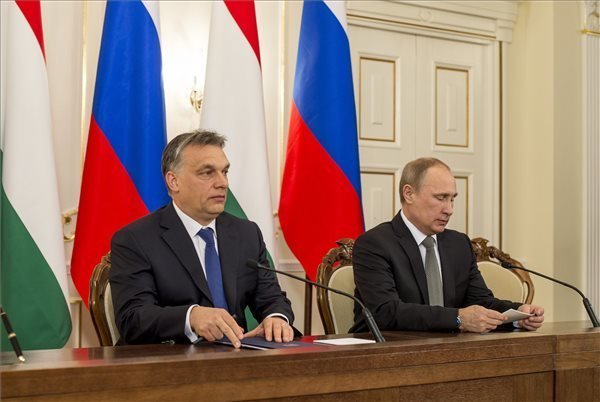Moscow, January 14 (MTI) – Representatives of Hungary and Russia signed in Moscow on Tuesday an inter-state agreement on cooperation with Russian involvement in the peaceful utilisation of nuclear power and in the construction of two new blocks at Hungary’s sole nuclear plant.
The agreement was signed in the presence of Hungary’s Prime Minister Viktor Orban and Russian President Vladimir Putin by Hungarian Development Minister Zsuzsanna Nemeth and head of Russia’s Rosatom Sergey Kiriyenko.
After the signing ceremony, Putin said that adding new blocks to the Paks power plant, which currently accounts for 40 percent of Hungary’s electricity output, would increase the country’s independence of energy supplies. Two of the four blocks of Paks nuclear power station are set to expire in 2037.
Kiriyenko said that Russia would provide Hungary with a loan to finance construction of the two new blocks, but added that the amount had not been defined. He said that it would be below the 10-12 billion euros set for the project. Kiriyenko said that the exact amount would be calculated on basis of current prices and the power plant’s technical parameters. He noted that the preliminary agreement on the Paks upgrade covered three areas: construction of the new blocks, fuel supplies, and servicing.
Putin said the two new blocks would double the plant’s current output of 2 gigawatts. He called the agreement “unique”, adding that over 40 percent of the project would be completed by the Hungarian party. “The Hungarian side will spend some 3 billion dollars on preserving jobs,” the Russian president said, noting that the Hungarian central budget would collect over one billion dollars in taxes thanks to the deal. Putin also said he was convinced that Tuesday’s agreements would contribute to broadening Russia-Hungary ties and cooperation.
Orban said the new nuclear energy agreement was a precondition for continuing and strengthening energy cooperation between Hungary and Russia. He referred to the Soviet-Hungarian energy agreement of 1966, saying it was “one of the few good legacies of Communism”. He said the new agreement was an “excellent professional deal”, and that financial talks on its implementation were in “good progress”. Hungary-Russia ties are “strategically important” for Hungary’s present and future, and Hungary is interested in promoting Russian business in the country, Orban said. He added that the Hungarian government is committed to “a long-term Hungary-Russia friendship”. Hungary will provide 200 Russian students with state scholarships from September, he announced.
On the subject of the South Stream gas pipeline project, Orban said that Hungary was committed to the scheme and would meet related contractual obligations. Orban said he appreciated Putin’s efforts to “put aspects of the future of Hungary-Russia ties in focus”, and Russian diplomatic efforts in the interest of Christian communities worldwide.
Meanwhile in Budapest, Janos Lazar, head of the Prime Minister’s Office, said that the Russian loan would be provided for a 30-year term, and the first new block would be commissioned in 2023. He added that Hungary’s energy independence would further increase with the blocks. The plan for the new blocks have been sent to Brussels, which has not raised any objections, Lazar said, adding that the investment would increase Hungary’s economic output by 1 percent and create ten thousand jobs.
As for the financing, Russia will provide support for 80 percent of the total costs in the form of a loan while Hungary will foot the remaining 20 percent.
Opposition green party LMP has called on the government to publish the details of the agreement signed in Moscow. Bernadett Szel, the party’s co-leader, told MTI that it appeared there was a danger that “Viktor Orban has in effect sold Hungary to the Russians”. She said it was as yet unclear what exactly had been signed in Moscow, and so LMP would do everything within its power to bring the entire text of the agreement out into the open. She said that in a normal country there would be a social and political debate on the issue, but this had failed to happen in Hungary. LMP has launched a petition on Facebook and is organising a demonstration, she said.
The E-PM electoral alliance also called for the details of the agreement to be made public. Benedek Javor, who sits as an independent lawmaker, said in a statement that on the basis of Hungarian laws, extant parliamentary decrees and the standpoint of the ombudsman, Orban had had no right to sign an agreement on “the most important parametres of the expansion”.
The current plant houses four Russian VVER-type reactors built in the 1980s.
Photo: Prime Minister’s Office/MTI – Barna Burger
